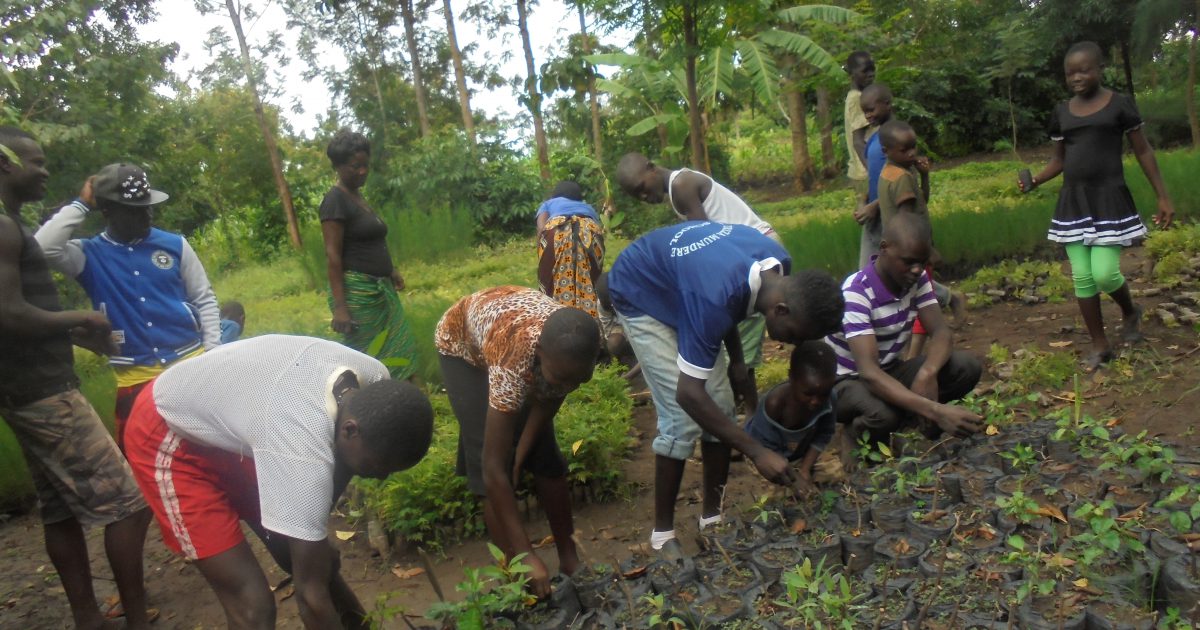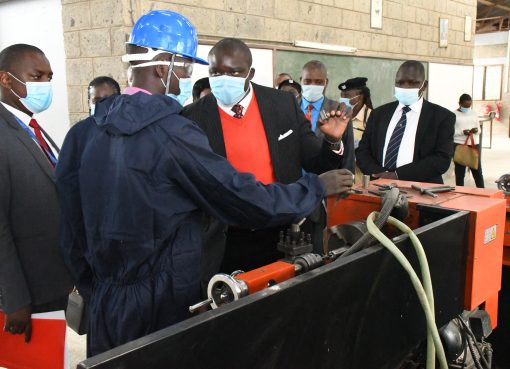Busia Saturday November 25, 2017 KNA by Salome Alwanda
For the past 21 years, the 56 year old Christian Maitha of Mudembi village in Budalangi constituency has not known any other source of livelihood a part from sale of seedlings. A walk into his home by KNA paints a good picture of the ever green forest probably in semblance to the biblical Garden of Eden.
Maitha who could not continue with formal education after standard seven due to lack of school fees narrates to the writer how he engaged in illegal border trade famously known as the coffee boom in 1977. He states that he was almost gunned down while carrying out the illegal trade, an incident that made him look for an alternative way of earning a living.
The father of 17, 2 his own , 3 orphans from his late brother says he gets customers from within and outside Busia County including Siaya County and the neighboring country of Uganda. “I have different species of seedlings including Grevilea robusta among others,” he says adding that he also has different varieties of palm trees for decorating homes.

The farmer adds that he also does grafting especially of oranges and mango trees.
He however cites marketing as a major challenge to his work adding that the situation has forced him to plant over mature seedlings on his six acre farm until there is no more space for farming. “At times we carry some seedlings to sell at the local market place with a few who come to buy from home,” he says adding that the sales help to raise his children.
He at the same time says tree planting has helped in educating his children, source of firewood and timber for construction. “Sometimes back, a customer came and bought 1,000 eucalyptus brandy species worth 200,000 and I was really happy,” he says.
Maitha is now requesting the relevant department help him find an outlet for his seedlings adding that some of the species can be planted along the banks of River Nzoia to control flooding. “I was motivated by a friend from Nambale constituency when I saw him get some little money from sales of seedlings,” he says adding that he started off with 1,000 seedlings.
He explains that with the support from his wife, they began by collecting seeds from available trees around their homestead. “By good luck an NGO called Action Aid came and bought the seedlings at sh. 2 each and we managed to get some cash to the tune of sh. 20,000.
An elated Maitha says that the business has made him open a bank account whose deposits fluctuate between shs. 50,000 to 100,000. He is requesting the government to support him with funds to plant 5 million seedlings to be planted by the local residents to restore the former green glory of Bunyala constituency. “Currently we have 150,000 trees; with these seedlings you cannot lack sh. 100 for buying soap or flour,” he says amid laughter.
He says forest officers bring students and women groups to learn from his work expressing hope that they will be of great help. His wife, Topister Ajiambo says the project has helped them raise their 10 children, 3 of his late brother in law and her four grandchildren “Marketing is a major challenge because at times the seedings over grow and at times we are forced to uproot and throw them” she says
Their son Justin Odwory says the trees have helped in his upbringing and education. He cites marketing and diseases as the major challenges explaining that most seedlings start yellowing adding that they have uprooted over 1,000 seedlings due to the problem. He aspires to follow his father’s footsteps in planting seedlings.
Thomas Otieno, also a local resident says he has been purchasing seedlings from Maitha for the past three years and expresses optimism that they will be of great help to him in future. “Now I have to buy these tree seedlings because they will help me in future especially in educating my children, building and also a source of fruits,” he says adding that he wants to purchase 50 different seedlings.
He adds that he has already planted 100 trees since he ventured into the exercise has a word of encouragement to Maitha to continue planting more seedlings so that other residents can buy from him. Busia County Forest coordinator James Were however says that the demand for seedlings production within the County currently outstrips the supply. “We have a number of our neighbors from Uganda coming to pick the seedlings from Kenya and I would encourage our farmers to venture into seedling production because even our central nursery cannot meet the demand,” he states.
Were discloses that the county is currently producing 100,000 seedlings per planting season against its targeted need of 300,000. “Basically the cost of a seedling production is around shs 10 and the cost of production is around Shs. 5 so the return is good,” he says urging farmers to venture into seedling planting to supplement the department’s production.
The Forest Coordinator further notes that the County has only 2% forest cover, a situation which he blames on shallow soils and low rainfall in some parts of the County. “But the attitude of the local community towards tree planting is a major challenge because most of our people do not value tree planting as an exercise, they do not embrace it as an important activity or as a commercial enterprise,” he says adding that the department through its extension officers has been able to train some of the farmers and convince them to adopt forestry as a commercial enterprise.
Were says that around 300 farmers within the County are currently engaged in planting mainly short crop rotation species especially eucalyptus brandy which grows very fast and can be harvested within five years. “We are currently trying to actively engage the farmers by giving them education in tree growing and providing them with certified seeds to establish their nurseries,” he says.
The official advises the farmers to stop complaining about financial constraints but come up with business plans so that they can get loans from banks and pay back. He discloses that the ban on the use of plastic has been a blessing not only to the service but to the county and the entire country and the department has come up with biodegradable containers that farmers can use when planting their seedlings.




